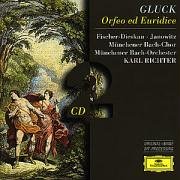| All Artists: Dietrich Fischer-Dieskau, Christoph Willibald Gluck, Karl Richter, Munich Bach Orchestra, Edda Moser, Gundula Janowitz Title: Gluck: Orfeo ed Euridice Members Wishing: 0 Total Copies: 0 Label: Deutsche Grammophon Release Date: 7/14/1998 Genre: Classical Styles: Opera & Classical Vocal, Historical Periods, Classical (c.1770-1830) Number of Discs: 2 SwapaCD Credits: 2 UPC: 028945314525 |
Search - Dietrich Fischer-Dieskau, Christoph Willibald Gluck, Karl Richter :: Gluck: Orfeo ed Euridice
 | Dietrich Fischer-Dieskau, Christoph Willibald Gluck, Karl Richter Gluck: Orfeo ed Euridice Genre: Classical
|
Larger Image |
CD Details |
CD ReviewsMen singing Orfeo/Orphée 07/22/2003 (4 out of 5 stars) "Knowing only Gluck's "Orphée et Eurydice" (Paris, 1774), I was interested to hear what the original "Orfeo ed Euridice" of Vienna, 1762, sounded like - was there a great deal of difference between the two versions? The answer is yes! Aside from the singing requirements - of which more anon - the first score sounds more like an early sketch for the expanded (and improved) Paris production of twelve years later, familiar and yet unfamiliar as well, and sometimes just plain frustrating!The role of Orfeo was written for an alto castrato so - since this voice-type is now happily unavailable - has usually been sung by either female contraltos or mezzo-sopranos until recent years, when a growing number of counter-tenors have joined the ladies. However, not caring to listen to any of the currently available CDs by the girls, and having a strong aversion to counter-tenors generally (although prepared to make an exception for Andreas Scholl) I chose this unique performance by a noted artist of the past.Fischer-Dieskau must have greatly admired the music of "Orfeo" and wasn't about to let the fact that he was a baritone stand in the way of his singing the title role, he simply transposed the part down an octave! And, not content with making a recording in 1957 (in German, which - with the transposition - must have had Gluck spinning in his grave!), he repeated the exercise ten years later, this time in Italian, which is the version now available on CD.Fine singer though Fischer-Dieskau was, this performance really is only a curiosity and doesn't work, because Orfeo was written for a high voice - whether male or female - and a baritone voice is simply too dark and heavy for Gluck's music this time. (Oreste, in Gluck's "Iphigénia en Tauride" is a baritone role which has some very attractive music.) I have to say, too, that I found the Italian of both chorus and soloists seemed very indistinct at times, and had me reaching for a libretto!The Parisian dislike of castrati, not to mention roles sung 'en travesti', led to the rewriting of the main role for the leading 'haute-contre' tenor Le Gros (who could reliably reach high E-flat in old pitch) and Orfeo finally became the masculine Orphée, with some incredibly beautiful - although often difficult - music to sing.However, due to the chronically short supply of true 'haute-contres', the ladies also usurped the role of Orphée, followed by the counter-tenors, and so there are just two examples currently available of Orphée being sung by a tenor, one being the 1956 recording by Léopold Simoneau, which is still highly regarded - despite the bravura aria from the end of Act I being cut - and was reissued on CD two years ago. The other - a performance on video of The Australian Opera's 1993 production of "Orphée et Eurydice" - is sung in the original 'haute-contre' key by the talented young Australian tenor David Hobson, who tackled not only the most difficult arias successfully, but recreated a virile, masculine Orphée who might have had Gluck nodding in satisfaction." A Novelty 01/31/2003 (3 out of 5 stars) "The conducting and chorus on this recording are only so-so, and Edda Moser is miscast as Amore. But Dietrich Fischer-Dieskau, once you get used to hearing a baritone singing the music instead of a mezzo-soprano, is a surprisingly good Orfeo. His "Chiamo Il Mio Ben Cosi" is one of my favorite renditions of that aria. Gundula Janowitz is also a very good Euridice. If you want a perfect recording of this opera, don't get this one, but if you want a nice, enjoyable performance, don't care too much about flaws, and want to hear an Orfeo who sounds like a real man for a change, then get this one by all means." A man as Orfeo!! dolcissima2780 | Pennsylvania, USA | 06/16/2003 (4 out of 5 stars) "Ok, so this may not be a period-practice or a period-instrument recording, but I am very glad this old version is available in the midst of all the period-performance recordings featuring mezzos as Orfeo. While I have nothing against mezzo-sopranos or ladies singing "trouser" roles, I like hearing men in male roles. Especially a romantic lead like Orfeo. Fischer-Dieskau does a fine job in the lead. He is probably one of the most capable singers of the 20th century. Gundula Janowitz has great technique and musicianship and really struts her stuff in this recording. Edda Moser is not particularly suited to the Amore role, however, she pulls it off.
The true greatness of this recording comes from Richter and the Munich Bach Orchestra. Richter is a fabulous conducter. Much better than some of the boring "period practice" conductors of today. Richter obviously has a great passion for this music and treats every note as if it were the ONLY note in the whole work. The Furies Dance and Dance of the Blessed Spirits are fantastic as well. Good recorded sound, although a bit outdated." |

 Track Listings (26) - Disc #1
Track Listings (26) - Disc #1